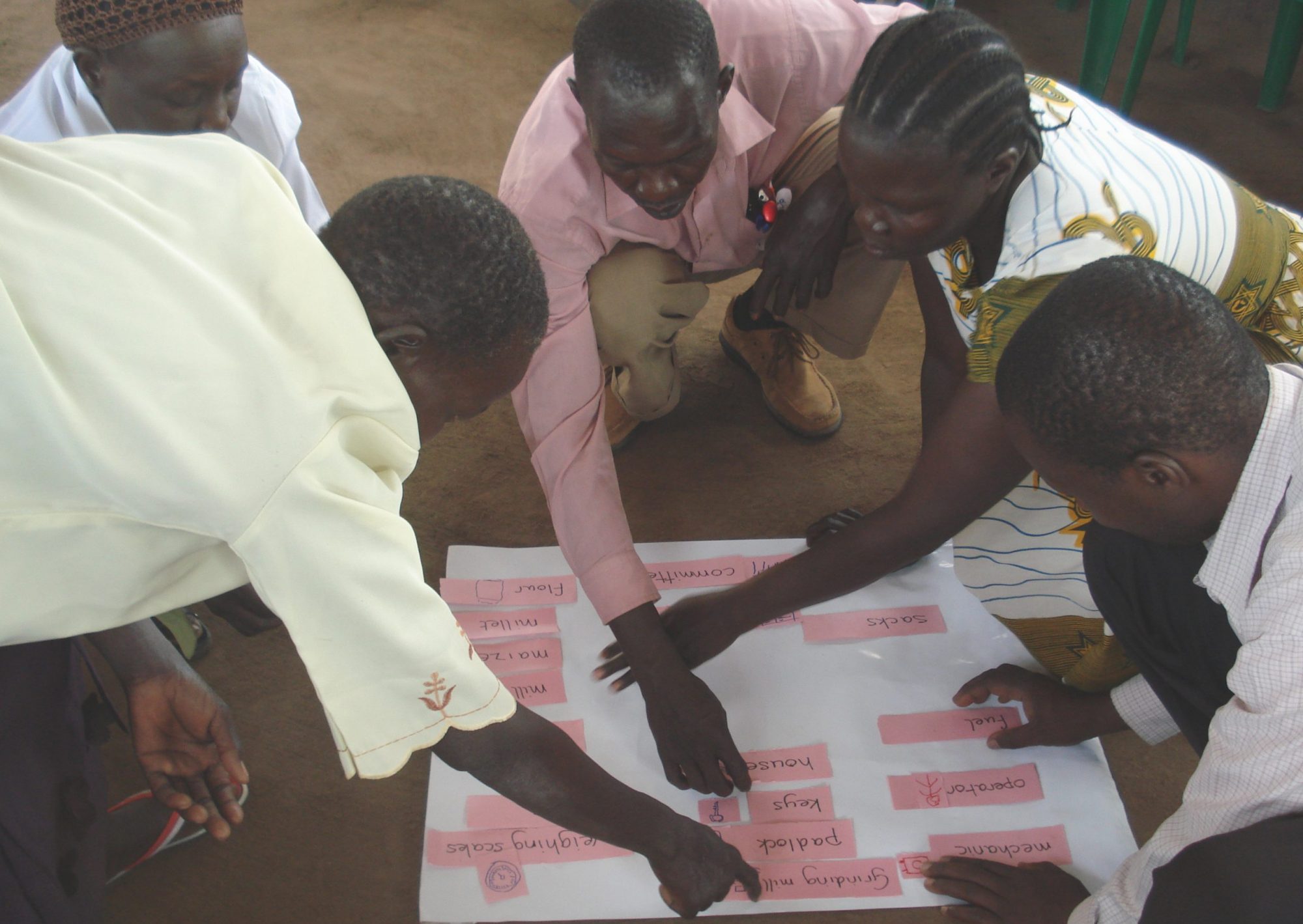Janelle Rabe
Durham University
Over the next few months, BALID will host a series of blogs exploring the role of informal learning and literacies in young people’s everyday lives. The series hopes to feature young people’s work and ideas, inspire intergenerational conversation and become the basis for future action / research in these areas. Learn more about the series here and how you can contribute.
Janelle Rabe of Durham University opens this series by sharing an exciting approach to engaging young people in conversations around sexual violence. Drawing from participatory research co-designed with young people, Janelle’s blog gives an insight into the importance of recognising young people’s voices and experiences when designing sexual health programmes.
WHY should we involve young people?
“Speak out! You are not alone!” – the young people in my project had this to say to their peers about sexual violence. Young people’s views are vital in effectively addressing sexual violence. However, they are rarely involved in programming and research on sexual health and sexual violence in the UK and globally . Young people think they should be involved because hearing from them will help their peers feel that they are not alone, and they can talk about their experiences. They are uniquely qualified to provide grounded perspectives on what works best for them .
I’ve always highly valued working with and learning from young people. I think they have fantastic ideas that we should listen to and act on. This prompted my ongoing Economic and Social Research Council (ESRC)-funded PhD study, a participatory action research (PAR) project led by young people on addressing sexual violence. PAR is considered an effective strategy in providing spaces for young people to shape the research process, such as identifying their topics of interest and their preferred methods of communicating.
WHO were involved?
Two groups of young people (13-18 years old) from a youth group and a school in North East England joined the project. The youth group comprised 15 young people (13-18 years old), 8 girls and 7 boys (two who identify as gay), while the school group involved 11 young people (16-17 years old), 8 girls and 3 non-binary.
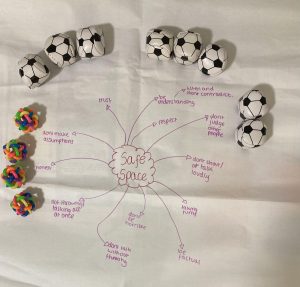
HOW did we work together?
Both groups co-created safe space agreements by deciding on the values that were important to them in working together such as respect, trust, and understanding.
Each group brainstormed and ranked its priority topics for the workshops. These included understanding sexual violence, young people’s education about sexual violence, and the effects of sexual violence on young people. Through a series of participatory workshops per group, we engaged in interactive activities such as body maps, vignettes, sorting and ranking, games, and discussion groups.
Icebreaker games and feedback were crucial parts of each session. Icebreaker games made young people feel comfortable and relaxed before we started the discussions. Meanwhile, their feedback were helpful in guiding me to adjust the activities to suit their needs. I aimed to be as open and flexible as possible. For instance, in a previous session, some of the young people said they preferred to do a role play but in the following session, they didn’t feel like it. I improvised a game on the spot which they enjoyed. Even in the icebreaker games and the snacks, I asked them for their preferences or provided them with options.
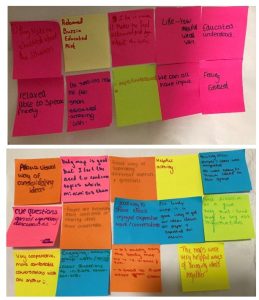
Their positive feedback about the workshops reinforced why working with young people is incredibly meaningful to me. I wanted to open spaces for them where they can freely express and enjoy themselves, even when dealing with sensitive topics. I’m pleased that the workshops have been safe spaces where they can learn from one another. Some of their feedback can be seen below.
Providing safe spaces
“Feeling safe and understood, we can all have input.”
“Janelle made me feel comfortable to share my thoughts and reminded us we can leave if we had to, this is a safe space etc.”
Learning from one another
“I liked how we were able to put forward our own opinions so I could understand other people’s points.”
“Group work allowed for more opinions to be heard (and a contrast in opinions).”
Highlighting young people’s feelings
“I like it because it makes me feel acknowledged about the topic.”
“The sessions make me feel smart, educated, amazing, and lush.”
WHAT did we find out together?
Emerging findings from the research project include a co-developed understanding of sexual violence and young people’s recommendations for improving relationships and sex education, and school responses to sexual violence. Young people felt they were not supported enough to recognize and respond to sexual violence in various contexts. They were disappointed with the limited discussion of sexual violence in their lessons. They thought their schools were not doing enough to show that they were taking sexual violence seriously. They also felt discouraged from disclosing, reporting, and seeking help after experiencing sexual violence. They recommended more targeted training for teachers to better respond to their concerns and in teaching the lessons. They also wanted to see concrete actions from schools to reassure students that speaking up about their experience would have a positive outcome for the young person affected by sexual violence. They wanted consistent support for these affected young people, such as mental health counseling, if necessary.
WHERE are we going next?
Working with and learning from the young people has been such a fulfilling experience. I am always amazed by their brilliant ideas and their passion for change. They have led the project in exciting directions that I didn’t anticipate. I am glad I decided to follow their lead.
Challenging the norms of adult-children dynamics was vital along with negotiating working relationships with the young people. I respected young people’s views and I didn’t want to impose my plans or decisions as the adult researcher. I consistently showed that I valued their insights in various aspects. I wanted to make them feel that we were doing a joint project together rather than it being just my project. I committed to this approach from the start because young people are rarely listened to, much less given a chance to lead discussions related to sex or sexual violence. There is often a stigma and a culture of silence even when young people want to learn more and do something about the issue. Through our project, I wanted to show the benefits of an alternative approach of involving young people that can be explored by other researchers and practitioners in the future.
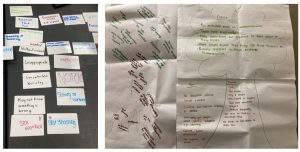
Moving forward, I am eager to engage more young people in the UK and my home country, the Philippines. I will also apply young people’s recommendations of involving diverse groups of young people such as those from ethnic minority communities, those with disabilities, and those with different sexual orientations. I intend to boost the impact of the project by disseminating young people’s insights and recommendations to policymakers, teachers, schools, parents and other young people.
Overall, young people’s feedback on the workshops emphasised their appreciation and clamour for having safe, non-judgmental and open spaces to discuss and learn about the issue of sexual violence together with their peers. It’s about time we listened to them and gave them the spaces they deserve.
—
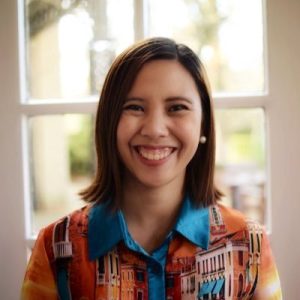 Janelle Rabe is a doctoral researcher at the Durham University Department of Sociology and a member of the Centre for Research into Violence and Abuse (CRiVA). Her PhD project is funded by the Northern Ireland and North East Doctoral Training Partnership (NINE DTP) and the Economic and Social Research Council (ESRC). She has a decade of experience working with non-governmental organizations and policymakers in the Philippines on child rights and development issues. She has contributed to policy advocacy campaigns leading to the passage of laws on raising the age of sexual consent, child nutrition and child protection.
Janelle Rabe is a doctoral researcher at the Durham University Department of Sociology and a member of the Centre for Research into Violence and Abuse (CRiVA). Her PhD project is funded by the Northern Ireland and North East Doctoral Training Partnership (NINE DTP) and the Economic and Social Research Council (ESRC). She has a decade of experience working with non-governmental organizations and policymakers in the Philippines on child rights and development issues. She has contributed to policy advocacy campaigns leading to the passage of laws on raising the age of sexual consent, child nutrition and child protection.
Email: anne.j.rabe@durham.ac.uk
Twitter: janelle_rabe
